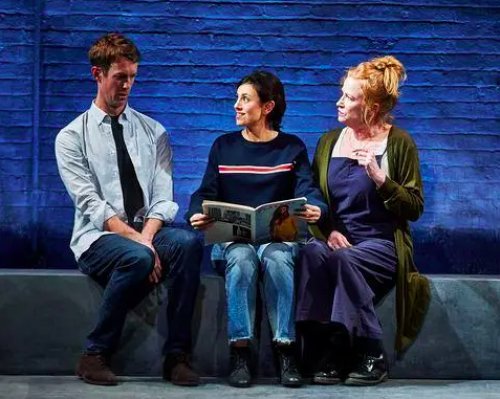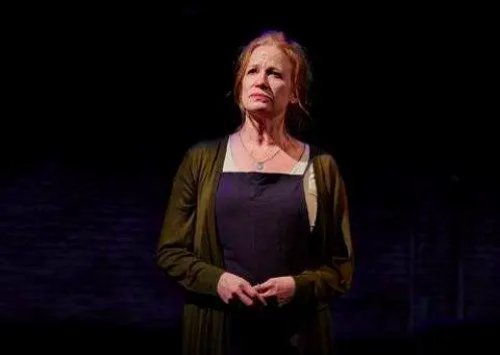
By: Darryl Reilly
…you’re waiting for—-I dunno—-something “better”——your career to take off, me to get bored with the topic, you to finally decide you “like” me. I have no idea, actually, but I do know we haven’t honestly discussed the things we need to discuss.
…And so that gives you the right to fuck “Audrey” in a shitty hotel in St. Louis?
Yeah, and it was actually a nice hotel.
This comes from a brutally raw exchange between a husband and wife in a disintegrating marriage, occurring an hour into Joan and jolting what had previously felt like a cerebral exercise into a moving theatrical experience.
Playwright Stephen Belber offers an intricate character study comprised of a barrage of brief nonlinear scenes chronicling the eventful existence of a woman from childhood to the age of 62. With the craft and depth of a fine novelist, Mr. Belber creates a mosaic of pointed incidents imparting vital information. These pass by rapidly with no discernable shape but then at the conclusion everything majestically falls into place.
Joan was born in Massachusetts to dysfunctional parents. She and her gay brother Charles move to New York City in the 1980’s. Belber wonderfully captures that milieu with authentic details. Joan becomes a photographer, Charles is an elementary school teacher and is out at nightclubs as AIDS emerges.
In 95 crisp minutes there is a rapid procession of jobs, romances, fluid sexuality, world-wide locations, an abortion, deaths, births and assorted events. Reenactments of the past are mixed with reflective speeches delivered directly to the audience.
Belber’s full-fledged portrait of one individual and those in contact with her are told from her perspective. The biographical catalogue is infused with literary devices and a deep purpose. Joan confesses that she has previously been an unreliable narrator in describing an event. Beautifully dramatized is the subtext of enduring the damage by a troubled family background as evidenced by Joan’s circuitous life journey with its bouts of self-sabotage, irrational decisions, selfishness and redemptive self-awareness.
Johanna Day is towering as Joan. Ms. Day employs the arsenal of skills great actresses possess as she physically and vocally transforms herself chronologically and emotionally with subtle effectiveness. It’s a magical stage performance that thoroughly achieves the illusion of the character’s differing states of being. She is joined by two equally as entrancing performers who succeed at the great task of impersonating the variety of figures in Joan’s life.
Depending on the lighting, Adam Harrington realistically appears to be in his 20’s or decades older when required. With his trim physique, lantern features, level delivery and WASP solidity, Mr. Harrington is astonishing. The gay brother, boyfriends, the husband and even Joan’s teenage son are all vividly brought to life by Harrington.
Dark-haired and willowy Marjan Neshat utilizes her intense gaze and slight foreign accent to haunting effect. Neshat portrays Joan’s mother, an exotic journalist, an earthy Russian waitress and more, all with personability and traces of appropriate sultriness.
Keeping the play’s fragmented narrative structure cohesive is accomplished by director Adrienne Campbell-Holt’s phenomenal staging. Ms. Campbell-Holt’s handling of the actors is flawless and her sense of the visual is supreme, totally realizing Belber’s epic vision.
“Inside of His Head” was Arthur Miller’s original title for Death of a Salesman and Jo Mielziner’s monumental scenic design conveyed the sense of the actions coming from Willy Loman’s consciousness. Andrew Moerdyk’s terrific compartmentalized set design has such a comparable thoughtful quality. The rectangular playing area is dominated by its gray brick back wall that changes colors and on which is projected designer Kate Ducey’s dreamy imagery. To one side of it there are patches of a distressed wall and to the other a wall in standard condition. Minimal, strategically placed furniture, most notably a large wing chair and a lamp on the floor simply depict the many places of the journey.
Grant Yeager’s wildly eclectic lighting design compounds the transitory dimension. Snippets of music from past eras and plot effects are rendered by Amy Altadonna’s electrifying sound design. Joan’s ensemble of overalls and a flowing sweater vest see her through the odyssey, while the “Man” and “Woman” wear everyday clothes artfully selected by costume designer Emily Rebholz that allows for quick changes.
The form of the memory play is taken to the zenith by Joan.
Joan (through February 16, 2019)
Colt Coeur
HERE Arts Center, 145 Sixth Avenue, in Manhattan
For tickets, call 212-352-3101 or visit http://www.coltcoeur.org
Running time: 95 minutes with no intermission
